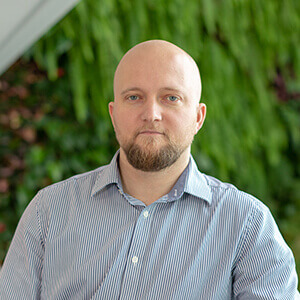Pawel
Current student, International student
- Subject area
- Mechanical, Electrical and Manufacturing Engineering
After completing my master's degree in Poland, I worked for 12 years in industry, both in Poland and Germany, dealing with various projects in the field of heating and heat recovering, ventilation, cooling and air filtration. I have worked both on the deep engineering/design and commercial parts of various projects for clients all over the world.
With each year of my career, I noticed an increasing gap between projects pursued in academia and most industries. Through such a lack of cooperation, I have seen a great delay in some industries implementing new technologies and solutions. On the other hand, many universities are working on problems that had long been solved in the industry. So, I decided to use my knowledge and professional experience to acquire new skills and work on something that has a chance to be applied in real life and have a significant impact.
There were several reasons why I decided to undertake my PhD at Loughborough University. One of the main ones is very good research base (equipment) and world-class staff within my department: the Centre for Renewable Energy Systems Technology (CREST). Another reason was the interesting topic of the project and the great potential that I saw in it from the very beginning. It was also very important for me to have direct cooperation with my supervisor, Professor Philip Eames, a world-renowned specialist in the field of renewable energy and technology.
The aim of my project is to develop solutions that will allow us to reduce the surge in electricity demand in local distribution systems in the morning and afternoon hours of the day. I deal with the theoretical and practical cooperation of a Stirling engine and high temperature sodium heat pipes with a thermal energy storage system. The aim is to develop a device that can store heat energy and convert it into electricity on demand. By using the Stirling engine, the cooling system, which is combined with the domestic hot water heating system, allows for a significant increase in the efficiency of such a system. The possibility of application of efficient high-temperature sodium heat pipes can significantly simplify all systems and allow implementation in regular homes.

One of the things I enjoy the most about my PhD is the freedom to conduct research and experiments, which is a huge advantage, but also can cause a lot of stress. The opportunity to learn new skills and meet new people is something that you will appreciate. I really appreciate the friendships I made during my project, both with other PhD students, University staff and local people.
Usually, I spend most of my working hours in the laboratory, building, assembling and testing another test stand or conducting experiments on an already ready test rig. I have to mention the obligatory coffee break because it is an important part of every day of my work. After 6:00pm, usually I enjoy dinner with my wife who also supports me a lot in my research work as she is an engineer herself. In the evenings I work at home on data analysis, design changes and CFD simulation. I try very hard not to work on weekends, because it is time to visit the nearby and more distant Loughborough surroundings and get to know British culture, traditions and cuisine (yes, I love to eat)!
To any future PhD students, choose a research field that is really interesting to you. A doctoral project is a long, arduous process, along the way you will face many challenges and many moments of doubt and discouragement. It is much easier to overcome these adversities if the research that we conduct is not only our job but also our passion. It is also worth mentioning that when, after many months of designing, simulation, calculations and construction, the data from the experiment are finally obtained, it is a truly joyful moment full of fulfilment!